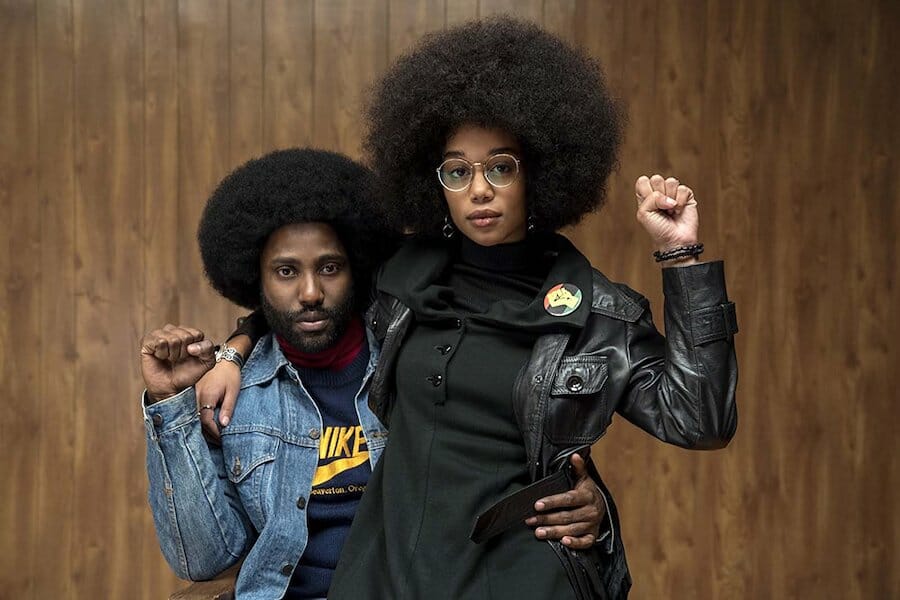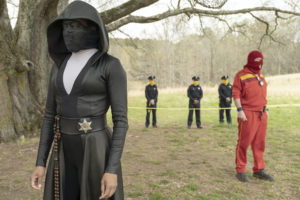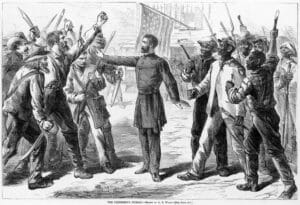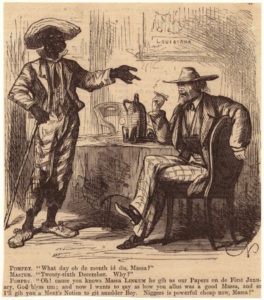Spike Lee Returns to Form With the Entertaining and Relevant ‘BlacKkKlansman’
The “Do the Right Thing” Oscar nominee is in play again this awards season with a refreshing, in-your-face look at racism. Actors John David Washington and Laura Harrier get into the act in Spike Lee's "BlacKkKlansman." (David Lee / Focus Features)
Actors John David Washington and Laura Harrier get into the act in Spike Lee's "BlacKkKlansman." (David Lee / Focus Features)
Ever since his early career peak, culminating in a best original screenplay Academy Award nomination for “Do the Right Thing,” Spike Lee has opined on the big screen with the same measure of nuance and subtlety he demonstrates courtside at Knicks games—which is to say, none at all. But when it comes to his latest movie, “BlacKkKlansman,” arriving amid a steady stream of footage of unarmed black men and boys subjugated and murdered by police around the U.S., maybe subtlety is the wrong tack. And, for the many white people who view this same footage not as evidence of police brutality but of black people operating outside the law, maybe Lee’s full-on approach will finally wake them up.
A Grand Jury Prize winner at Cannes, the new movie is based on the memoir “Black Klansman,” by Ron Stallworth. In it, a black cop, played by John David Washington, and his Jewish partner, Flip Zimmerman (Adam Driver), infiltrate the Colorado Springs chapter of the Ku Klux Klan in the 1970s.
As a newly assigned rookie at the start of the film, Stallworth quickly rises to the rank of undercover detective, assigned to a speaking engagement by Kwame Ture (a.k.a. civil rights activist Stokely Carmichael). There, he wears a mike and records a fiery address (Ture is played by Corey Hawkins in a moving cameo), hitting inspirational points on pride, hope and persistence.
“If I am not for myself, who will be for me? If I am only for myself, what am I? If not now, when?” he asks, quoting rabbinical sage Hillel the Elder. The sequence stops the film’s narrative and gives Lee a chance to do what he has often shown a penchant for: proselytizing. But what gorgeous proselytizing it is—timeless truths about social justice over ellipsing images of Ture’s audience, eyes uplifted, a dimly lit portrait montage tastefully rendered through cinematographer Chayse Irvin’s artful lens. It’s an example of “BlacKkKlansman” at its finest, matched only by the rhapsodic dance sequence that follows at the local bar to the Cornelius Brothers and Sister Rose’s “It’s Too Late to Turn Back Now.”
Stallworth’s dance partner is the stunning Patrice Dumas (a ravishing Laura Harrier), president of the Black Student Union, which sponsored Ture. Patrice is drawn to Stallworth despite his more moderate politics. But although his tight-ass cop routine smoothly counters her militant hippie groove, their romantic subplot ultimately feels sketched-in.
With Ture moving on to his next speaking engagement, Stallworth is left without an assignment, stalling the screenplay written by Charlie Wachtel and David Rabinowitz along with Kevin Willmott and Spike Lee. The movie restarts with Stallworth at his desk, impulsively calling the KKK and reaching Walter Breachway (Ryan Eggold in a cartoonish, shifty-eyed performance).
From this point forward, Stallworth maintains the phone persona of the Klan infiltrator, with Zimmerman as his face. Why they don’t simply let Zimmerman lead is anyone’s guess, but soon he is in close quarters with the Klan, bearing the intense scrutiny of bug-eyed racists, particularly Felix (Finnish actor Jasper Pääkkönen), who suspects he’s a Jew. As the tension ratchets up, Driver takes over the movie.
In a misstep, Lee portrays Klansmen as spectacularly dumb, personified by borderline imbecile Ivanhoe (Paul Walter Hauser, the hilarious henchman in last year’s “I, Tonya”), and Felix’s wife (Ashlie Atkinson), who fantasizes in bed about killing black people. By broadening the tone, Lee not only defuses dramatic tension but trivializes the threat posed by today’s emboldened racists.
Complications ensue when Stallworth is chosen as bodyguard to Klan Grand Wizard David Duke, played by Topher Grace in a monochromatic, though subtly hilarious, portrayal. Duke is visiting Colorado Springs to oversee the induction of new members, including Zimmerman—who goes by the name Ron Stallworth (don’t ask). Further complicating things is the fact that the real Stallworth has become phone pals with Duke, without the latter knowing he is talking to a black man.
As “BlacKkKlansman” winds to a close, Lee and his trio of writers show casual interest in plot machinations, using their narrative framework to address pressing issues instead. A Harry Belafonte lecture recalling a gruesome lynching is juxtaposed with grotesque Klansman cheering on their forebears portrayed in the 1915 film classic “The Birth of a Nation.” Though Belafonte effectively delivers, it’s not the strongest montage, even if Lee makes his point.
Lest anyone not get it, he hammers the point home with footage of Charlottesville, Va., 2017, where white nationalists clashed with protesters at the “Unite the Right” rally. And yes, we see Trump with his familiar, “very fine people” quote describing racists who attended that event, such as James Alex Fields Jr., the man who struck and killed Heather Heyer.
As Stallworth, Washington, a former professional footballer and costar of the Dwayne Johnson HBO series “Ballers,” ably anchors the movie with an honest performance, free of gimmicks. But while he is convincing, with an easygoing charm one might expect from the son of Denzel Washington, his range of expression is limited.
As Zimmerman, Adam Driver is looser than his by-the-book rookie counterpart. Their easy chemistry is underscored by jazzy compositions by frequent Lee collaborator and composer Terence Blanchard, which are, like the movie itself, evocative of the era, though not of it.
While the Hollywood establishment seems to pride itself on avoiding subjects that actually matter, exceptions can be found in this film’s producers, Jordan Peele and Jason Blum, who teamed on last year’s sleeper hit, “Get Out.” Samuel Goldwyn once said, “If you’ve got a message, send a telegram.” What he didn’t understand is that movies are telegrams, albeit with outlandish trimmings.
“BlacKkKlansman” has everything anyone would want from a cop movie, but its candid treatment of its subject matter and the conversation it might inspire are the telegram that audiences deserve.
Your support matters…Independent journalism is under threat and overshadowed by heavily funded mainstream media.
You can help level the playing field. Become a member.
Your tax-deductible contribution keeps us digging beneath the headlines to give you thought-provoking, investigative reporting and analysis that unearths what's really happening- without compromise.
Give today to support our courageous, independent journalists.









You need to be a supporter to comment.
There are currently no responses to this article.
Be the first to respond.